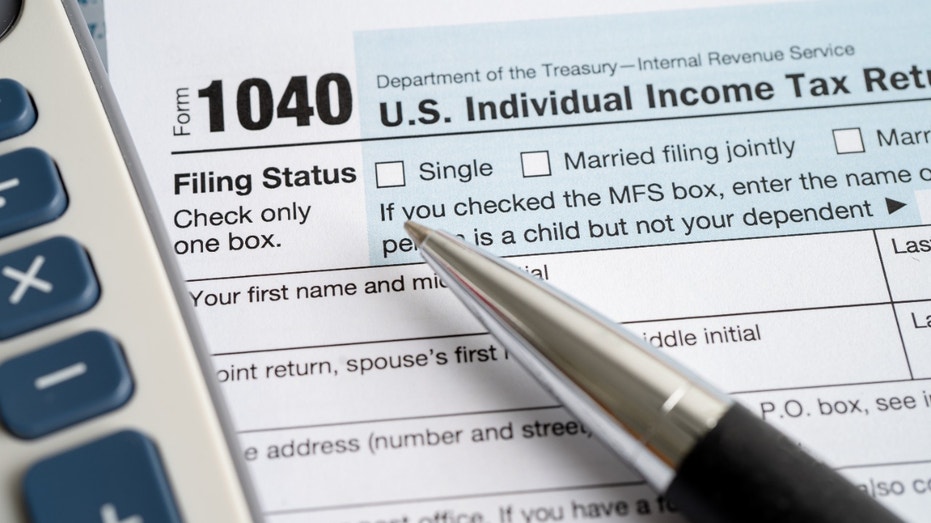Still need to file your taxes? Last-minute tips for late filers
Tips for filing your taxes ahead of the 2024 deadline
The 2024 tax filing season is officially coming to an end.
Americans must file their taxes or request an extension to file by April 15, or risk paying a penalty.
If you haven’t filed yet, here’s what you need to know:
When is the deadline to file taxes?
Most taxpayers will have until Monday, April 15 to submit their returns or request an extension.
However, there are some exceptions.
THE MOST COMMON TAX SEASON SCAMS - AND HOW TO PROTECT YOURSELF
Taxpayers living in Maine or Massachusetts have until April 17 to file their taxes due to state holidays. Individuals who live in a federally declared disaster area may also have additional time to file.

View of the Internal Revenue Service building in Washington, D.C., on Jan. 24, 2023. ((Photo by STEFANI REYNOLDS/AFP via Getty Images) / Getty Images)
How do I apply for an individual tax extension?
An individual can request an extension online by filling out Form 4868 using the IRS’ "Free File" tool. You need to submit the form by the tax-filing deadline or print the form and mail it to the IRS address for your state, making sure it's postmarked by April 15.
Once you file the extension, you have until Oct. 15, 2024, to file your taxes.
However, there are pros and cons to requesting an extension.
Is there a penalty if I don't file my taxes by April 15?
If you do not file your taxes by April 15, you can be hit with a failure-to-file penalty. That amounts to 0.5% per month on the unpaid amount, which can add up to 25% of taxes due.

A blank 1040 tax return form from the IRS. (iStock / iStock)
Should I file an extension if I can't file my taxes by the deadline?
There are pros and cons to requesting a tax-filing extension.
It can give filers more time to thoroughly review a return and take advantage of tax benefits, like various deductions and credits available to help reduce liability.
REMOTE WORKERS FACE A DOUBLE TAXATION THREAT
By pushing back the filing date, you can also avoid a failure-to-file penalty.
Experts caution that filing for an extension does not mean you can delay paying the government the taxes that are owed. If you owe taxes, you should pay them before April 15 in order to avoid a potential penalty or interest on what you owe.
"Extension to file is not an extension to pay," Eric Bronnenkant, head of tax at online financial adviser Betterment, previously told FOX Business. "A common misconception is that you get more time to pay, and that’s not true."
What happens if I can't afford to pay my taxes?
The IRS offers some payment plans to individuals who are unable to pay the full amount of taxes they owe.
If you need to request a payment plan, attach a Form 9465 Installment Agreement Request to your return, asking the IRS to set up a monthly payment plan.

People review tax forms on a laptop computer. (iStock / iStock)
The more you pay by April 15, the less interest and penalty charges you’ll owe later.
What happens to my refund if I don't file by April 15?
If you're expecting to receive a refund this year, and you ask for an extension, you won't get that money until you've filed your return. The sooner you file, the sooner you get your refund.
YOUR TAX BILL COULD BE MUCH LOWER THIS YEAR - HERE'S WHY
How can I get my tax refund ASAP?
The majority of taxpayers can typically expect to receive a refund from Uncle Sam.
For many families, the money can be substantial. Nearly three-quarters of filers received a tax refund in 2023, with an average payment worth about $3,176.
In order to receive your refund within 21 days of filing, the IRS has cautioned that you must file your return electronically, ensure that it is accurate and complete and request to receive the refund via direct deposit.

IRS headquarters in Washington, D.C., on Feb. 25, 2022 (Al Drago/Bloomberg via Getty Images / Getty Images)
The IRS expects to receive more than 128.7 million individual tax returns by this year's deadline.
However, the tax collecting agency warned that some returns may require "additional review" and take longer to process if their systems identify any errors, if there are mistakes on the return or if it suspects theft or fraud.
Can I track my refund status?
GET FOX BUSINESS ON THE GO BY CLICKING HERE
Taxpayers can track their refund using the IRS' "Check My Refund Status" tool.
When you submit your information, you can see when the IRS received your return, when your refund has been approved and when your refund has been delivered.
The information is all available 24 hours after you've filed your taxes electronically, or four weeks after submitting a paper return. To use the tool, you need to provide your Social Security number, filing status and exact refund amount.





















